School News
—
—
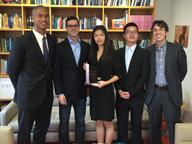
A team of NYU students, including Andrew Hamlet (MBA ’16), Troy Manos (MBA ’16) and Zewei Liu and Yang Yang from the NYU Courant Institute of Mathematical Sciences, earned the top spot in the inaugural Iowa MBA Business Analytics Case Competition.
School News
—

A team of NYU students, including Andrew Hamlet (MBA ’16), Troy Manos (MBA ’16) and Zewei Liu and Yang Yang from the NYU Courant Institute of Mathematical Sciences, earned the top spot in the inaugural Iowa MBA Business Analytics Case Competition.
Research Center Events
—
Dean Peter Henry and Kerry Kennedy Discuss the Role of Business in Society
—
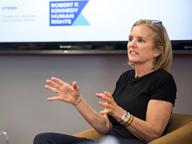
On April 20, 2016, the NYU Stern Center for Business and Human Rights hosted a discussion between Dean Peter Henry and Kerry Kennedy, President of Robert F. Kennedy Human Rights. Topics included the business case for human rights, Ms. Kennedy's history of human rights activism and how investment can be a game changer with respect to human rights in the business context.
Research Center Events
—

On April 20, 2016, the NYU Stern Center for Business and Human Rights hosted a discussion between Dean Peter Henry and Kerry Kennedy, President of Robert F. Kennedy Human Rights. Topics included the business case for human rights, Ms. Kennedy's history of human rights activism and how investment can be a game changer with respect to human rights in the business context.
Research Center Events
—
Stern's Center for Real Estate Finance Research Hosts Fifth Annual Spring Symposium
—
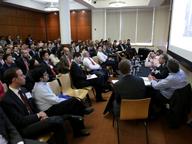
NYU Stern's Center for Real Estate Finance Research hosted the Fifth Annual Spring Symposium, "Commercial Real Estate Development in NYC: A Golden Age or a Cooling Market?" The symposium featured leading real estate experts, four different panels and explored recent development activity in several major sectors.
Research Center Events
—

NYU Stern's Center for Real Estate Finance Research hosted the Fifth Annual Spring Symposium, "Commercial Real Estate Development in NYC: A Golden Age or a Cooling Market?" The symposium featured leading real estate experts, four different panels and explored recent development activity in several major sectors.
Research Center Events
—
Measuring Human Rights Performance: Metrics that Drive Change
—

NYU Stern's Center for Business and Human Rights and RFKennedy Compass Program at Robert F. Kennedy Human Rights will host a workshop, Measuring Human Rights Performance: Metrics that Drive Change, 20 - 21 April at NYU in New York City.
Research Center Events
—

NYU Stern's Center for Business and Human Rights and RFKennedy Compass Program at Robert F. Kennedy Human Rights will host a workshop, Measuring Human Rights Performance: Metrics that Drive Change, 20 - 21 April at NYU in New York City.
Research Center Events
—
Innocence Project Attorney Seema Saifee Delivers Eleventh Annual Haitkin Lecture
—

Seema Saifee, staff attorney for the Innocence Project, delivered the 11th annual Haitkin Lecture, hosted by NYU Stern’s Business & Society Program, to an audience of undergraduate Stern students.
Research Center Events
—

Seema Saifee, staff attorney for the Innocence Project, delivered the 11th annual Haitkin Lecture, hosted by NYU Stern’s Business & Society Program, to an audience of undergraduate Stern students.
Faculty News
—
Professor Roy Smith weighs in on economic reform in China
—

Excerpt from Bloomberg -- "China’s decades of rapid development under tight Communist Party control may be coming to an end, according to Roy Smith, the New York University academic who as a banker in 1990 anticipated Japan’s decline. 'China has now arrived at an existential moment after nearly 40 years of extraordinary economic progress,' said Smith, who also warned about budding Japan-like financial strains ahead of the Chinese stock rout in 2015. The country’s 'increasingly complex and troubled economic and social system with all its scarcities' will make it tougher for Communist cadres to manage, he said."
Faculty News
—

Excerpt from Bloomberg -- "China’s decades of rapid development under tight Communist Party control may be coming to an end, according to Roy Smith, the New York University academic who as a banker in 1990 anticipated Japan’s decline. 'China has now arrived at an existential moment after nearly 40 years of extraordinary economic progress,' said Smith, who also warned about budding Japan-like financial strains ahead of the Chinese stock rout in 2015. The country’s 'increasingly complex and troubled economic and social system with all its scarcities' will make it tougher for Communist cadres to manage, he said."
Faculty News
—
Professor Brad Hintz discusses Wall Street cost cutting
—

Excerpt from Bloomberg -- "We can look back to the history of Wall Street, and if you look back, you had an industry that was a much larger, relative investment banking business--much smaller trading. So the issue that we have is the trading business, since the Crisis, have not been able to beat their cost of capital. You look at these banks and--how many years out are we since the Crisis--and we only have a couple of them who are operating above 10 percent ROE. The rest of them are all dragging down. And of course, you're seeing that in terms of the valuation."
Faculty News
—

Excerpt from Bloomberg -- "We can look back to the history of Wall Street, and if you look back, you had an industry that was a much larger, relative investment banking business--much smaller trading. So the issue that we have is the trading business, since the Crisis, have not been able to beat their cost of capital. You look at these banks and--how many years out are we since the Crisis--and we only have a couple of them who are operating above 10 percent ROE. The rest of them are all dragging down. And of course, you're seeing that in terms of the valuation."
Faculty News
—
Professor David Yermack discusses the impact of blockchain technology on the future of banking
—

Except from the Australian Financial Review -- "David Yermack, a professor at New York University's Stern School of Business, said blockchain could lead to far fewer banks and perhaps even remove the need for share-trading exchanges. It would render redundant millions of employees who execute and record financial transactions across banking, asset management and insurance, he said."
Faculty News
—

Except from the Australian Financial Review -- "David Yermack, a professor at New York University's Stern School of Business, said blockchain could lead to far fewer banks and perhaps even remove the need for share-trading exchanges. It would render redundant millions of employees who execute and record financial transactions across banking, asset management and insurance, he said."
Faculty News
—
Professor Jonathan Haidt discusses the impact of liberal politics on climate change
—

Excerpt from The New York Times -- "Responses aren’t necessarily driven by ignorance. 'Where there is a sacred value that empirical science contradicts,' science will have trouble making headway, notes Jonathan Haidt, a social psychologist at the Stern School of Business at New York University."
Faculty News
—

Excerpt from The New York Times -- "Responses aren’t necessarily driven by ignorance. 'Where there is a sacred value that empirical science contradicts,' science will have trouble making headway, notes Jonathan Haidt, a social psychologist at the Stern School of Business at New York University."
Faculty News
—
Professor Jonathan Haidt's research on "concept creep" is highlighted
—

Excerpt from The Atlantic -- "Jonathan Haidt, who believes it has gone too far, offers a fourth theory. 'If an increasingly left-leaning academy is staffed by people who are increasingly hostile to conservatives, then we can expect that their concepts will shift, via motivated scholarship, in ways that will help them and their allies (e.g., university administrators) to prosecute and condemn conservatives,' he writes."
Faculty News
—

Excerpt from The Atlantic -- "Jonathan Haidt, who believes it has gone too far, offers a fourth theory. 'If an increasingly left-leaning academy is staffed by people who are increasingly hostile to conservatives, then we can expect that their concepts will shift, via motivated scholarship, in ways that will help them and their allies (e.g., university administrators) to prosecute and condemn conservatives,' he writes."
Faculty News
—
Professor Thomaï Serdari comments on Christian Dior's new Archi Dior jewelry collection
—

Excerpt from Luxury Daily -- "'For a fashion house, jewelry collections are brand extensions,' said Thomaï Serdari, Ph.D., founder of PIQLuxury, Co-editor of Luxury: History Culture Consumption and adjunct professor of luxury marketing at New York University, New York. 'These allow the brand to reach out to a broader audience whose interests are not focused on fashion exclusively and incentivize existing customers to spend more on brand extensions,' she said. 'While brand extensions may be priced to move the brand lower in the pyramid of luxury brands, in the case of Dior, its line of high jewelry is intended to reinforce the luxury status of the fashion house. In that sense, Dior’s jewelry collections are complementary to the creations of its fashion lines.'"
Faculty News
—

Excerpt from Luxury Daily -- "'For a fashion house, jewelry collections are brand extensions,' said Thomaï Serdari, Ph.D., founder of PIQLuxury, Co-editor of Luxury: History Culture Consumption and adjunct professor of luxury marketing at New York University, New York. 'These allow the brand to reach out to a broader audience whose interests are not focused on fashion exclusively and incentivize existing customers to spend more on brand extensions,' she said. 'While brand extensions may be priced to move the brand lower in the pyramid of luxury brands, in the case of Dior, its line of high jewelry is intended to reinforce the luxury status of the fashion house. In that sense, Dior’s jewelry collections are complementary to the creations of its fashion lines.'"
Faculty News
—
Professor Lawrence White explains how external factors impact investor behavior
—

Excerpt from Bankrate -- "The thing that surprises Lawrence White, a professor of economics at NYU's Stern School of Business, about Bankrate's poll is that the number of worried investors isn't higher. 'I would have expected more people to have said, "Oh I'm more nervous about what the future holds, so that's going to make me more cautious about investing in the stock market,"' White says."
Faculty News
—

Excerpt from Bankrate -- "The thing that surprises Lawrence White, a professor of economics at NYU's Stern School of Business, about Bankrate's poll is that the number of worried investors isn't higher. 'I would have expected more people to have said, "Oh I'm more nervous about what the future holds, so that's going to make me more cautious about investing in the stock market,"' White says."
School News
—
MBA student Jackie Kroeger-Donovan is interviewed about her company, Theatre Galleria
—

Excerpt from Medium -- "'Having participated in theatre productions for most of my life, I began to notice how prohibitively expensive production costs can be,' founder Jackie Kroeger explained, 'Theatres often build all their production materials from scratch, and then once the show is complete, these expensive costumes, sets, and props often go in the trash or are stored somewhere, unused.'"
School News
—

Excerpt from Medium -- "'Having participated in theatre productions for most of my life, I began to notice how prohibitively expensive production costs can be,' founder Jackie Kroeger explained, 'Theatres often build all their production materials from scratch, and then once the show is complete, these expensive costumes, sets, and props often go in the trash or are stored somewhere, unused.'"
Press Releases
—
First Textbook on Business and Human Rights Aims to Close the Educational Gap for Next Generation of Leaders
—
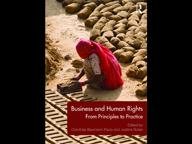
In a global economy, multinational companies often operate in jurisdictions where governments are either unable or unwilling to uphold even the basic human rights of their citizens. As part of its work to educate the world’s future business leaders, the NYU Stern Center for Business and Human Rights today released the first comprehensive, interdisciplinary textbook on the human rights challenges facing businesses – and how to approach solutions.
Press Releases
—

In a global economy, multinational companies often operate in jurisdictions where governments are either unable or unwilling to uphold even the basic human rights of their citizens. As part of its work to educate the world’s future business leaders, the NYU Stern Center for Business and Human Rights today released the first comprehensive, interdisciplinary textbook on the human rights challenges facing businesses – and how to approach solutions.
Business and Policy Leader Events
—
University Prof. Steven Koonin Delivers Lecture on “Can We Ever Get to a Zero-emissions World?”
—

University Professor Steven Koonin delivered a lecture on "Can We Ever Get to a Zero-emissions World?" to the NYU community on April 18.
Business and Policy Leader Events
—

University Professor Steven Koonin delivered a lecture on "Can We Ever Get to a Zero-emissions World?" to the NYU community on April 18.
Faculty News
—
Professor Thomas Philippon's research on Greece's debt is featured
—

Excerpt from The New York Times -- "Three economists, Pierre-Olivier Gourinchas, Thomas Philippon and Dimitri Vayanos, examined the history of Greece’s debt boom and bust in a new paper. They contend that in terms of money borrowed and economic output lost, the Greek crisis has far exceeded even the classic emerging market busts in Latin America and Asia — many of which were resolved via various forms of debt restructuring. As a result, they conclude, the very thought that Greece can pay its way out of this mess without having its debt reduced in some way is fantasy."
Faculty News
—

Excerpt from The New York Times -- "Three economists, Pierre-Olivier Gourinchas, Thomas Philippon and Dimitri Vayanos, examined the history of Greece’s debt boom and bust in a new paper. They contend that in terms of money borrowed and economic output lost, the Greek crisis has far exceeded even the classic emerging market busts in Latin America and Asia — many of which were resolved via various forms of debt restructuring. As a result, they conclude, the very thought that Greece can pay its way out of this mess without having its debt reduced in some way is fantasy."
Faculty News
—
Professor Roy Smith discusses the big banks and the creation of "living wills"
—

Excerpt from Business Insider -- "'Banks don't want to put that down in writing because those are profitable businesses and anything they say about that could come back and be used by regulators to haunt them if some sort of downturn were to happen.' To Smith's mind, regulators want in writing that the banks would divest trading assets to the point that the firms would go back to the time of the Glass-Steagall act, which kept investing and commercial banking separate. Banks don't want to have the possibility of losing that profit and are trying 'to get through this without giving up anything they don't want to.'"
Faculty News
—

Excerpt from Business Insider -- "'Banks don't want to put that down in writing because those are profitable businesses and anything they say about that could come back and be used by regulators to haunt them if some sort of downturn were to happen.' To Smith's mind, regulators want in writing that the banks would divest trading assets to the point that the firms would go back to the time of the Glass-Steagall act, which kept investing and commercial banking separate. Banks don't want to have the possibility of losing that profit and are trying 'to get through this without giving up anything they don't want to.'"
Faculty News
—
Professor Jason Greenberg's co-authored research on the influence of alumni connections in attracting MBA talent is featured
—

Excerpt from TopMBA -- "'Students look to and trust an alumnus from their school who ‘looks like them in three years’ to provide inside information about growth opportunities within the firm,' said Jason Greenberg, coauthor of the study and a management professor at NYU Stern with a particular interest in social networks. Indeed, when asked what led them to accept an MBA job offer, the number one choice in the sample was ‘growth potential’."
Faculty News
—

Excerpt from TopMBA -- "'Students look to and trust an alumnus from their school who ‘looks like them in three years’ to provide inside information about growth opportunities within the firm,' said Jason Greenberg, coauthor of the study and a management professor at NYU Stern with a particular interest in social networks. Indeed, when asked what led them to accept an MBA job offer, the number one choice in the sample was ‘growth potential’."
Faculty News
—
Professor Rosa Abrantes-Metz discusses price manipulation in the gold and silver markets
—

Excerpt from Kitco News -- "Abrantes-Metz was the economist for the plaintiffs gold and silver manipulation lawsuits. She is also one of the first researchers to publish a paper which highlights a decade of manipulation. 'As I discussed in your program [Kitco News] before with respect to gold, and the same applies to silver, the structure of these fixings and the empirical evidence were very telling in supporting collusion and manipulation. If we in fact learn that actually was the case, I would be the least surprised person out there,' she said in her email."
Faculty News
—

Excerpt from Kitco News -- "Abrantes-Metz was the economist for the plaintiffs gold and silver manipulation lawsuits. She is also one of the first researchers to publish a paper which highlights a decade of manipulation. 'As I discussed in your program [Kitco News] before with respect to gold, and the same applies to silver, the structure of these fixings and the empirical evidence were very telling in supporting collusion and manipulation. If we in fact learn that actually was the case, I would be the least surprised person out there,' she said in her email."
Faculty News
—
Professor Jonathan Haidt discusses the concept of happiness from his book, "The Happiness Hypothesis"
—

Excerpt from Today -- "'True happiness comes when you get three kinds of relationships right,' [Haidt] told TODAY. 'The one between yourself and others, between yourself and work or something productive and between yourself and something larger than yourself.'"
Faculty News
—

Excerpt from Today -- "'True happiness comes when you get three kinds of relationships right,' [Haidt] told TODAY. 'The one between yourself and others, between yourself and work or something productive and between yourself and something larger than yourself.'"
Faculty News
—
Professor Arun Sundararajan discusses Lyft's spending in Asia
—

Excerpt from Bloomberg -- "Uber needs to show investors, who have given the company a valuation of $62.5 billion, that it’s capable of turning a profit at home if it intends to sink more money into Asia, says Arun Sundararajan, a New York University business school professor. 'The expectations on when Uber will hit profitability have a shorter clock on them because Uber’s valuation is so high,' he says. 'Lyft has a little more runway.'"
Faculty News
—

Excerpt from Bloomberg -- "Uber needs to show investors, who have given the company a valuation of $62.5 billion, that it’s capable of turning a profit at home if it intends to sink more money into Asia, says Arun Sundararajan, a New York University business school professor. 'The expectations on when Uber will hit profitability have a shorter clock on them because Uber’s valuation is so high,' he says. 'Lyft has a little more runway.'"
School News
—
MBA student Lenore Champagne Beirne is interviewed about her experience at Stern
—

Excerpt from Medium -- "Stern has a collaborative culture, and it has been great to see the creativity, business results, and relationships that can grow in that environment. One professor in particular has made a major impact on my leadership style — Dr. Dolly Chugh, in our Management department. Professor Chugh models leadership. She also encourages us to think big in terms of the jobs we take after Stern, and provides concrete tools to help us achieve that."
School News
—

Excerpt from Medium -- "Stern has a collaborative culture, and it has been great to see the creativity, business results, and relationships that can grow in that environment. One professor in particular has made a major impact on my leadership style — Dr. Dolly Chugh, in our Management department. Professor Chugh models leadership. She also encourages us to think big in terms of the jobs we take after Stern, and provides concrete tools to help us achieve that."
Faculty News
—
Professor Roy Smith discusses Bernie Sanders' and Hillary Clinton's comments on the financial industry
—

Excerpt from Bloomberg -- "Roy C. Smith, a finance professor at the New York University Stern School of Business and a former Goldman Sachs partner who started on Wall Street in 1966, said the attacks on the financial industry by Sanders aren't a surprise. Clinton's statements are drawing more attention as Sanders causes her to take more liberal stances. 'Bernie has said this stuff for so long, so we're not really surprised by him,' he said. 'Now Hillary is starting to say it. She has been increasing her rhetoric on the capital markets sector, which is making some people who are in it uncomfortable and squirming a little.'"
Faculty News
—

Excerpt from Bloomberg -- "Roy C. Smith, a finance professor at the New York University Stern School of Business and a former Goldman Sachs partner who started on Wall Street in 1966, said the attacks on the financial industry by Sanders aren't a surprise. Clinton's statements are drawing more attention as Sanders causes her to take more liberal stances. 'Bernie has said this stuff for so long, so we're not really surprised by him,' he said. 'Now Hillary is starting to say it. She has been increasing her rhetoric on the capital markets sector, which is making some people who are in it uncomfortable and squirming a little.'"
Research Center Events
—
Big Data and Sustainable Development
—
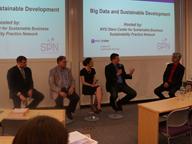
Students, academics and practitioners from the non-profit and business communities gathered at NYU Stern on April 14 for a discussion on “Big Data and Sustainable Development,” co-hosted by Stern’s Center for Sustainable Business and The Sustainability Practice Network.
Research Center Events
—

Students, academics and practitioners from the non-profit and business communities gathered at NYU Stern on April 14 for a discussion on “Big Data and Sustainable Development,” co-hosted by Stern’s Center for Sustainable Business and The Sustainability Practice Network.
